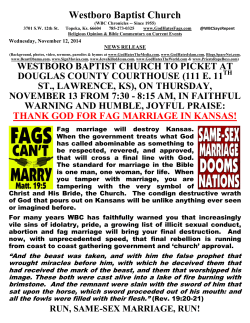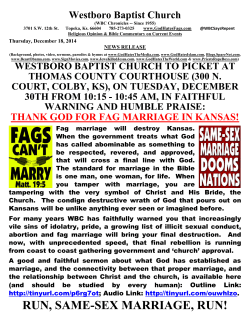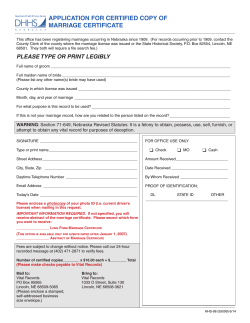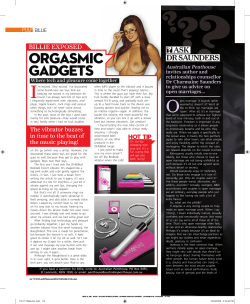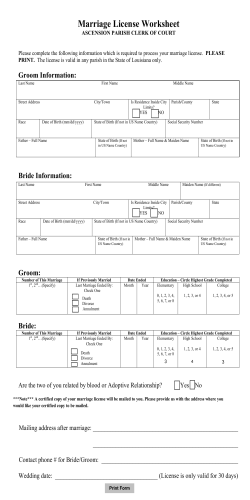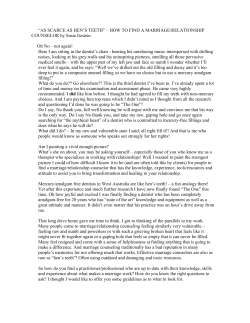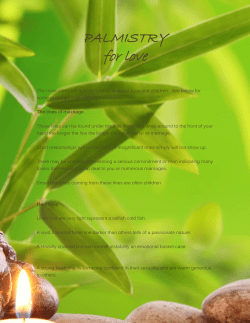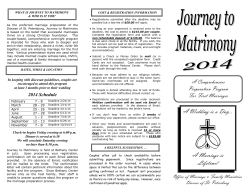
A `No` vote would be `devastating` - Rory O`Neill
24 marriage referendum arguments for ‘yes’ The Mayo News • Tuesday, May 19, 2015 arguments for ‘yes’ marriage referendum Tuesday, may 19, 2015 • The Mayo News ‘Why should our son’s love be seen any differently to ours?’ Frank and Anne Chambers from Newport on why they will be voting ‘Yes’ on Friday Edwin mcgreal edwinmcgreal@mayonews.ie F “We just want to be treated equally, that mine and my partner Graeme’s relationship, we’ve been together ten years, is seen the same as that of my brother and his girlfriend of five years is treated,” said Francis. He speaks of the 160 differences between civil partnership and civil marriages in Ireland. “That day (the civil partnership ceremony) was very special to us and it was a day of love and celebration but there are a lot of rights and protections from marriage that we do not have under civil partnership,” explained Francis. rank Chambers from Newport and Anne Gallagher from Currane, Achill met in Tiernaur Hall 36 years ago. Two years later they were married. That the same right is afforded to their eldest son Francis is a source of anguish to them. “We got married because we love one another and we would like Francis and every other young person like Francis to have the same chance for happiness as we have. We feel that marriage is, first of all, about love,” said Anne. “We’ve two boys and we’re very proud of them and we don’t see why one should be any different than the other. They’re not any different in God’s eyes and I think God would like us to vote yes,” added Frank, sitting in the kitchen of their home at Knockbreaga, Newport. Francis committed to his long-term partner Graeme Fisher in a civil partnership ceremony in 2012 but as they are unable to marry currently, he feels ‘less than’ and unequal. ‘God’s people’ Religion plays a big role in the Chambers house. Frank, Anne and Francis all have strong faith. “Voting yes would send out a big message to young people struggling with who they are and I’d like people to consider that and I’d just like the good priests to say something at Mass to help people who are unsure to vote yes and do the right thing. They’re God’s people, the same as everybody else. It’s right to vote yes,” said Frank. And Anne, who was a national school teacher for forty years, takes issue with the commentary among many on the no side that same sex parents cannot be as good parents as a conventional mother and father. “We were dealing with children from all family backgrounds and the one key element in a child’s life to help them succeed is to know that they were loved. “I think we need to show people the way forward and this is a perfect opportunity for people to show we can treat everyone with dignity and respect and to show their love for one another and I would, as a parent, ask anyone who may be as yet undecided that they would help us, help Francis and young people like Francis, by marking yes on the white paper on May 22,” said Anne. The Chambers family candidly recall the period around Francis coming out in 2001 as a troubling time. “We were heartbroken because that wasn’t what we had planned for him and then we were very anxious that he might have a very lonely life. We did feel a bit alone because we wouldn’t have known anybody else in the same situation,” recalls Anne, a daughter of former TD Denis Gallagher. Francis admits he went through a huge personal crisis at the time – which nearly had a tragic end. “I ended up in hospital on Christmas Eve, 2000 for attempted suicide,” said Francis. “I hadn’t told my parents at that time because I thought it would be harder for them to accept than me. I couldn’t accept it myself either. “Being a person who has experienced depression purely because you think you are less in society and to see a lot of talk about children in this referendum debate … Well we are children too and that’s what this referendum is about, us the children and grandchildren and < FRANKLY SPEAKING Francis Chambers (centre) pictured with his parents Frank and Anne at the family home outside Newport last week. A ‘No’ vote would be ‘devastating’ - Rory O’Neill Ciara Galvin ciaragalvin@mayonews.ie BALLINROBE native and accidental gay rights activist Rory O’Neill has said it will be ‘crushing’ and ‘devastating’ if the marriage referendum doesn’t pass. In an excerpt from a candid interview which will feature in a documentary, ‘Queen of Ireland’ about he and his alter ego Panti Bliss, Rory spoke about what a majority ‘No’ vote would mean for the LGBT people of Ireland. He explained that it would not be crushing that he would not be able to get married, but that ‘the people will have spoken’ and they will have said ‘actually no, that there’s a limit of our acceptance to you’’. The bar owner continued; “There’s a limit to our respect for you and you’ve reached that limit … and we don’t actually think you’re the same as us and I don’t think you should be a full and equal citizen.” O’Neill said the referendum is Your views Letter to the editor nieces and nephews and brothers and sisters of people,” he said. ‘Heartbreaking’ ‘powerfully personal’ because all the people in the country ‘got together and decided you’ve reached your place in society’. He added that gay people in Ireland would take it ‘horribly personally’. Speaking about the aftermath of the referendum if it doesn’t pass, Rory said that though he won’t think of moving away, he thinks lots of young people will as a result. < ADVOCATING A YES VOTE Ballinrobe’s Rory O’Neill. Headford group sing ‘Yes’ ahead of referendum Ciara Galvin T HE group behind the water protest song ‘No privatisation, Irish Water, Irish Nation’ has penned a marriage referendum song. Headford ensemble ‘The Rolling Tav Revue’ have put pen to paper and picked up their instru- ments for ‘Everybody’s Voting Yes’. Speaking to The Mayo News, Donal Gibbons said the song came about after a recent gig in Campbell’s Tavern in Cloghanover, Headford. “We were having a chat after the last Bank Holiday gig we did and the referendum came up. We all just said ‘Everybody should vote yes’ and then we put a melody to it and it grew into a song. There’s no agenda 25 we’re just a bunch of lads saying what we think,” explained Donal. Lyrics of the song include, ‘John put on your party dress, we’re heading to the wedding of Teresa and Jess’. The video was shot in the infamous Campbell’s Tavern kitchen a number of days after the song was created. Since the video was uploaded to YouTube the video has gained close to 7,000 views. The group’s previous song about Irish Water gained close to 90,000 views on the video sharing site since last December. “We just talk about different things, a bit of a social commentary, there’s not many people doing that anymore. It’s important to raise these issues, it’s not a case of doing a song to be cool,” said the musician. The song is performed by Donal, Aindrias De Staic, Noelie McDonnell, Liam Ivory, Eímhin Cradock, Geoff Ward and William Merrigan. Dear Sir I would like to thank those members of the clergy who have not felt compelled to tell me how I should vote in the upcoming referendum. I am deeply disappointed yet again that some members of the Catholic Hierarchy and Faith have still not learned to listen to the lived experience of many of its flock. I am a difficult Catholic for deeply personal reasons that have had a profound impact on my capacity to practice my faith safely. However my faith cannot be taken from me or indeed my Catholicism. As the privileged and honoured parent of a Gay son, I celebrate his difference and sameness. I am so struck with the lack of understanding of the unconditionality and wisdom of Parental Love by elements of the ‘No Campaign’. In particular even if I reduce any God of my understanding to that of a loving human parent, under no circumstances does exclusion of any sort or on any basis carry any weight for any reason. I do not need statistics or experts or research to tell me what is right or wrong. There are not degrees of inclusion. Voting No in the upcoming referendum is a vote to exclude. As Rory O’Neill so eloquently and simply put it, it is personal. A No vote is excluding the Gay uncle, aunt, sister, brother, son, daughter or grandchild in all our families from exercising a civil right. I will take it personally if my son is excluded from partaking in a civil marriage in his birth country. Love and exclusion do not go together. We understand difference and equality and we know exclusion even when it is spoken with deft and clever words. It cannot be hidden. When I heard on the news that several Bishops had felt it necessary through a letter to encourage a No vote in a civil matter, my heart went out immediately to those young people in the congregation struggling with their sexuality. Just when it has become slightly easier to be Gay, the words of exclusion and judgement again from a pulpit. I also thought of those of my peers who have had to live elsewhere and who have never been able to be themselves in their own country, or able to come out to their parents, and then I thought of those who have in the past had to take their Gayness to the graves with them unable ever to live fully the live that was given to them. I thought we were done with the politics of exclusion. The fear mongering rhetoric I have heard over the last few days is deeply concerning. I thank Mary Mc Aleese and Tom Curran for standing so well beside their sons. I believe in Marriage but respecting and strengthening it does not mean excluding. Children need loving parents more than anything else. I am as I said privileged in the deepest sense of the word to be the parent of a Gay son. I am grateful that he had the freedom to come out when he did. I feel proud that I did something right in the huge challenge of parenting, so that he was able to come out to himself most importantly and to those he chooses to. What an honour and what a relief. I shudder to think of the secret life he might have endured like so many of our people. He has chosen to live out of this country whilst his reasons may not be entirely to do with his orientation, I was relieved for him that he is somewhere it is easier to be gay. I was also indeed helped by a Catholic Priest at the time whom I spoke to who told me when I was very scared for him ‘to go home and love him’. Love does not exclude. I salute those who live their Gay lives in Ireland and particularly rural Ireland. I want for my son, what his sibling will over the summer partake in, a civil marriage. Please consider those in all our families who may be struggling and consider the message a No vote will mean to them. I thank both of my adult children for their honesty and ongoing openess and for all I have learned about what it is to love a child and bring them safely to adulthood, Yours sincerely, Ruth MacNeely 26 marriage referendum arguments for ‘No’ The Mayo News • Tuesday, May 19, 2015 arguments for ‘No’ marriage referendum Tuesday, may 19, 2015 • The Mayo News Referendum about more than ‘I do’ - Mothers and Fathers Matter Anton McNulty antonmcnulty@mayonews.ie T HE people of Ireland are being misled and patronised by the Yes campaign to believe that the marriage referendum is about ‘love and equality’ and not about ‘the family’ according to organisation, Mothers and Fathers Matter. The group, who are advocating a No vote in Friday’s Marriage Equality Referendum, were in Castlebar last week where they gave a talk entitled ‘In Defence of Marriage’ in the Welcome Inn Hotel. The main speaker was Kate Bopp, a spokesperson for Mothers and Fathers Matter, who told the people in attendance that the marriage referendum was ‘far more than simple redefining marriage’. “Government and Yes campaigners want the public to believe that the Marriage Referendum is necessary to provide couples in same-sex relationships with legal security and State recognition. But this is untrue. Couples in same-sex relationships can already avail of civil partnerships. Civil Partnerships provide same-sex couples with virtually all the rights and entitlements that married couples enjoy. “There is no significant difference in law between the two. Civil partnership ceremonies are practically identical to civil marriage ceremonies – down to the saying of ‘I do’. Same-sex couples have vastly more legal protections that other categories of co-dependent adult, such as elderly siblings living together or carers and careers living together,” she said. Simplifying the vote Speaking to The Mayo News prior to the meeting, Ms Bopp said she was critical of the Yes campaign for claiming the No side was trying to prevent samesex couple from being together “ It diminishes the role of the Taoiseach for him to be making hallmark card type comments. - Kate Bopp and simplifying the vote as one about love and equality. “There is a lot more to this than about people being in love and saying I do. We are being misled and patronised to believe the change in the constitution is essentially about romance and people being in love. It diminishes the role of the Taoiseach for him to be making hallmark card type comments. The Taoiseach has been in politics for over 40 years and I’m sure his understanding of the constitution is not backward to think the change in the constitution is simplified by romance,” she said. Ms Bopp denied that the No campaign was scaremongering but based on evidence where same sex marriage legislation has been passed in other jurisdictions. She said in these countries laws on surrogacy had to be changed and she believes if the referendum is passed, laws on assisted human reproduction will also be changed as a result. “If the referendum passes Your views Letters to the editor same-sex married couples will have exactly the same constitutional status as a husband and wife married to each other. It will be impossible for the State to give a preference for a child having both a mother and a father when it comes to adoption, surrogacy and donor assisted human reproduction. In each of these areas the Constitution will require that some children be deliberately deprived of either a mother or a father, not through force of circumstance but by State decree. ‘Absolute adult equality’ “A passed referendum may also confer upon same-sex married couples a constitutional right to surrogacy and donor assisted human reproduction. They will certainly have a constitutional right to procreate. The only way same-sex couples can procreate is by using these ‘services’. In such a case there would be a constitutional right for two men to create a child who would y CAMPAIGNING No campaigners from the west gathered in Eyre Square in Galway last week. have one woman as a biological mother (through egg donation), another woman as a birth mother (through womb rental), but would be left motherless for the rest of her life. That child may never even meet either her biological mother or her birth mother. This is a direct consequence of the Yes campaigners version of absolute adult equality,” she claimed. Ms Bopp added that while society shows that children are brought up in single parent families without any problems, this is down to circumstance and not done deliberately to the child. She said the referendum was not about equality for gay people and a Yes vote would not give them any more rights than they already have with Civil partnership. She claimed the issue of equal recognition of same sex unions under the law could be resolved if legislators ‘get back to the drawing board and do the job for which they are being handsomely paid’. “There is far more to this referendum that Yes campaigners would like to admit. If we vote No we at least make it possible for the Oireachtas to vindicate a child’s right to a mother and a father. We also send a message to the Government that the Irish people believe that, all other things being equal, children deserve the love of a mother and a father over and above the love of any random combination of adults. If we vote Yes we don’t give same-sex couples any more statutory rights than they already have. Instead we enshrine within the Constitution the view that children can never have any kind of right to a mother and a father.” ‘We should be aware of what is at stake here’ Archbishop Michael Neary is calling for a ‘No’ vote on Friday On Friday next, the people of Ireland will be asked to vote in a referendum that will change the meaning of marriage in the Constitution of Ireland. The Church’s position on this is entirely positive: it is against the proposal to redefine marriage. We are not taking a conservative viewpoint or wilfully inhibiting genuine progress. We are not being mean-spirited towards those who have same-sex attractions. On the contrary, we regard marriage as the central and crucial social relationship, which is of natural law and plays an indispensable part in human life. This is seen nowhere more than in pro-creation and the parenting of children. What happens in marriage serves the common good of both the man and the woman and society itself. Our view of Christian marriage, properly explained and understood, is not in any way disrespectful of people who experience same-sex attraction. As a Church we believe every person is equal in the sight of God and should always be treated with love, dignity and respect. There is no denying the fact that marriage faces difficulties throughout the Western world today. These pressures impinge on all, but particularly on children. In the forthcoming referendum we are not just being asked to redefine marriage, we are redefining the family and depriving, in the words of Pope Francis ‘the rights of children to grow up in a family with a mother and a father’. One of the most important and fundamental questions that each of us has to consider is the rights of the child. Following the referendum on Children’s Rights our laws now enshrine the principle that, in all decisions relating to a child, the welfare of the child must be paramount. ‘Crucible of our humanity’ The family is the crucible of our humanity, the miniature world in which we learn how to face the wider world. The family is the seedbed of the future, the best way we have yet found of fostering security and trust. We should be aware of what is at stake here. We are in fact redefining the family. Throughout history and across all cultures, marriage has been consistently understood to be the union of male and female with procreative potential. A society that identifies the two parties in marriage as spouse I and spouse II has lost sight of a deep truth of human nature: Do the complementary roles of mothers and fathers matter in the upbringing of children?; Are we going to be the first generation in human history to say that mothers and fathers don’t matter anymore in the upbringing of children? Pope Francis has been very clear in his response to this question. As he said recently: the family is the foundation of co-existence and a guarantee against > MAKING HIS VIEW KNOWn Archbishop Michael Neary 27 social fragmentation. Children have a right to grow up in a family with a father and a mother capable of creating a suitable environment for the child’s development and emotional maturity. This referendum is not and should not be about judging the various family types which have always existed as a reality in Ireland. Deserve support Married parents and single parents deserve as much support as possible as they live out the challenging vocation of parenthood. It is a referendum, however, which is seeking to redefine the very values underpinning our faithbased and cultural understanding of marriage itself, the consequences of which will impact upon our future generations. In saying this we are not disparaging anyone, nor are we being disrespectful to same-sex relationships. Despite what we are led to believe this referendum is not about same-sex relationships or about equality, but about the family. Civil partnerships have already been introduced which give same-sex couples the same rights as heterosexual couples in terms of inheritance rights, next-of-kin status, employment, and tax related benefits. Such relationships ought not, however, be classified as marriage. So why the need to redefine marriage? The effects of this proposed amendment will be far-reaching for this and for future generations. We invite people of faith to bring this decision to prayer. In the coming days, and particularly in May, the month of Mary, we call for prayer for marriage and the family. In conclusion marriage is of fundamental importance for children, mothers, fathers, and society. Marriage should remain a cornerstone of the family unit and all of us need to reflect deeply before changing it. This article is an abbreviated version of a homily delivered on behalf of Archbishop Neary at churches throughout the Tuam Archdiocese on May 9/10. Sir, I wish to reply to the opinion piece ‘Yes is the only option’ written by George Hook in The Mayo News on May 5. His understanding of marriage as a relationship between consenting adults is totally wrong. The purpose of marriage is to strengthen the loving sexual bond between men and women so that when and if children are born from that love they will have made a commitment to rear them to adulthood. Hook also states “the world is big enough to cope with everything the human race has to offer”. That is absurd. The human race can offer hatred, genocide, selfdestruction and even the physical world is in danger from humans. He also states “Nature does not discriminate on life”. Nature always discriminates. Nature has given us all different talents, different abilities even different facial features so that we can recognise one another. Sexual attraction by nature for the vast majority is the opposite sex. For a small minority, possibly 3 per cent (this figure is disputed) it is the same sex. So it is not a case of unequal but different. Marriage is for heterosexual couples. Partnership, relationship, call it what you will in law is for same sex couples because it is a different concept and construct to marriage. The slur of the No campaigners (I am delighted to be one) trying to keep Ireland in the Stone Age contradicts Mr. Hook’s desire for a fair debate. The idea of marriage for gay couples is only prevalent in Europe and USA mainly in English speaking countries. Indeed many countries have rejected the whole idea and this is the reality of life in the 21st century. The last coalition government led us to economic disaster and the opposition did not shout stop. This present coalition is leading us to moral disaster and the opposition is not shouting stop. Democracy is leading us astray but it is all that we have. The full consequences of a Yes vote have been clouded in a haze of feel good factor and of making progress. This is because gay people have been discriminated against in the past and have suffered greatly. But offering them marriage is an illusory vision. Changing the core idea of marriage will lead to its disintegration, which has stood the test of time ensuring the very survival of society. I have refrained from answering Hook’s innuendos at religion or the use of Christian faith arguments in this reply. But the attitude of those in power that no conscience clause will be permitted, smacks of dictatorship. I appeal to all those who have not yet made up their minds, to vote No for the common good of our country, our communities and our families. Sir, I hold that ‘Marriage’ is exclusively a union between a man and a woman and I shall vote NO in the Referendum. My purpose for writing this letter is to see if the rights of those who may have difficulties of conscience about supplying such weddings can be protected. I am thinking of photographers and those who provide wedding cars, banquets, music etc. I have read of the most extraordinary legal cases being taken against people in America, Britain and I think also in Northern Ireland in relation to this matter. I would fear that the same thing could happen here unless precautions are taken. In practice we probably only talk about a relatively small number of people but their consciences should be respected and they should not be put in this horrible position. The fact that the civil law changes does not mean that a person’s conscience automatically adjusts to suit it. As I see it, it is not a question of judging the same sex couples but a question of asking myself, what should I do if I believe it is wrong? It a friend asks me to put a selective weed killer on his vegetables which I should consider to be dangerous, what should I do? I would say no. I think people should be allowed to say No in this matter. Provided the couples are told politely that there is a problem of conscience, I would hope that most people would accept it and make some other arrangements with people who would gladly provide the service without any scruples. I would imagine that it would be happier for the spouses themselves to be surrounded by people who are at ease to attend to them, than people who are only there to avoid a lawsuit. If the emergency services are required, obviously they have to go. I am most definitely not motivated by homophobia but I do want to see that people can follow their consciences. I am not trying to imply that everyone should have a conscientious objection. Very good people may view the thing from different angles. In the past, conscientious objectors were given non-fighting tasks to perform, even in wartime. We now seem to have a situation in which one could be sued for not carrying out a task against ones conscience which someone else would gladly do. Recently I heard a government minister give an interesting interview on the radio. At the end he mentioned the Same Sex Marriage Referendum. I heard this part from another room but I think I heard it correctly. The gist seemed to be that he hoped we would vote Yes. He himself would have voted No some years ago but now he has seen the light. In general it is alright, there are some religious problems but they are irrelevant. Unfortunately they may be irrelevant to a lot of people but they are still very relevant to many people of whom some have given votes to you and your party over the years. Surely there could be a perfectly respectful conscience clause inserted which would only mean that the same sex couples would have to accept that providers of services could ask to be excluded on conscientious grounds. Surely it is not asking very much? If someone were to tell me that a job which I asked them to do caused them a conscience problem, I would gladly tell them to leave it. I hope and trust there is still some way of resolving this problem. Le meas, Liam Sadler, Sheeaune, Westport Respectfully, Name and address with Editor. 28 marriage referendum Opinion The Mayo News • Tuesday, May 19, 2015 Opinion marriage referendum Tuesday, may 19, 2015 • The Mayo News Same sex couples deserve the right to commit to each other An Taoiseach Enda Kenny I am asking my County, Mayo, to vote Yes for their family and their future generations. It is indeed rare, if not unique, that we get the chance to vote on something as unquantifiable yet transformative as love.But this week that is what we will be doing. On May 22, Irish voters have an opportunity to take a stand for equality when our country votes in a referendum on marriage equality. What we do in the privacy of the ballot box will have a profound impact on the public life and the personal lives of our family members – for some, sons and daughters, nieces and nephews, for others cousins and friends. By voting Yes, we will ensure that all couples can share the benefits of civil marriage, regardless of their gender. We will ensure that people will be treated equally no matter who they love. We will acknowledge that samesex couples, like other couples, deserve the equal right to commit to each other “ Follow us on Twitter twitter.com/themayonews It’s true to say I have had my own personal journey in relation to marriage equality with the words, ‘I do’. Over the last four years, the Government has been working hard to secure our recovery and to get people back to work. We have shown our true character - our resilience, determination, and capacity for hard work. Crucially for us in our economic recovery we are asking ourselves: how will we define our value and our values into the future? While other countries have introduced marriage equality with legislation, Ireland will become the first country in the world to hold a referendum so that the Irish people themselves make this decision. We have the chance to say that no-one should be discriminated against simply for who they love. It’s true to say I have had my own personal journey in relation to marriage equality. The people of Mayo have elected me to the Dáil since 1975, so I have been there to see key legislative milestones - the decriminalisation of homosexuality in 1993, Fine Gael’s 2004 Civil Partnership proposals that led to legislation in 2010, the recent Child and Family Relationship Act. And through the years, as I worked more with openly gay men and women, including TD’s and Ministers; I have seen their lives and listened to their stories. But that does not mean this is an easy issue for everyone and I know some voters have real concerns. Legal distinctions Some have asked me why not leave civil partnership as the legal option for same-sex couples? Civil Partnership is a separate and unequal relationship status. There are legal distinctions between the two, including the ability of civil partners to receive certain family protection rights from the Constitution. Civil partners also are not entitled to judicial separation and face unclear next-of-kin rules for example. As a State, we already have an institution in place to give loving, committed couples full legal rights, and that is civil marriage. For those who worry about protections for religious freedom, it is important to highlight that this change affects civil, not religious, marriages. Irish law separates Church and State - this will not change. This vote will allow samesex couples to receive full legal protections, and will not force any church to recognise same-sex marriage. Impor- > VOTING YES Seamus Conboy, Yes Campaigner, meets An Taoiseach Enda Kenny in Castlebar last week. Pic: John O’Grady tantly, marriage equality will not in any way affect the institution of marriage. It will only extend equal legal protections to all couples. Others wonder how legalising samesex marriage impacts adoption and surrogacy. The Referendum Commission, an independent body, has stated clearly that this referendum is about equal marriage and has nothing to do with adoption, surrogacy or parentage rights. Simply put, this referendum does not in any way affect parental rights. On May 22, the question being put to people is about equal marriage. It’s a direct proposition that Marriage may be contracted in accordance with law by two persons without distinction as to their sex. It is my great hope that Mayo and Ireland not only says ‘Yes’, but that great numbers go to polls on the question of marriage equality. Even if you feel this issue does not personally affect you, it is a declaration to your friend, neighbour, relative that you stand for equality for everybody, and as a country, we respect all loving couples who seek to commit their lives to each other. Only a ‘No’ vote can fully protect the rights of children Senator Rónán Mullen O ne image coming from the tragic earthquake in Nepal has particular significance for our marriage referendum debate. A photo showed Israeli gay couples carrying their babies after they had been airlifted to safety. In Israel, the law restricts surrogacy to malefemale parents. So a commercial surrogacy provider brings impoverished Indian women over to Nepal to carry the babies for Israeli gay couples. The human eggs are harvested from women in South Africa. None of these babies will ever know a mother. Their last experience of a mother’s love has been left behind in Nepal. So could we make sure that any surrogacy in Ireland will be restricted to male-female couples, when the Government acts on its intention to legalise it? Actually, no. Not if there is a Yes vote on May 22. If we redefine marriage in our Constitution, same-sex married couples will have the exact same constitutional right to start and found a family. On strict equality grounds, they will be able to knock down any attempt by the Dáil and Seanad to give preference to a child’s having a father and mother. A Yes vote affects adoption too. Up to recently, general eligibility to apply to adopt was confined to married couples or a single relative of the child. Single people, including gay people, could adopt in particular circumstances. While the best interests of a child are generally best served by having a mother and father, the Government recently abolished any special preference for married couples or unmarried malefemale couples. There was very little consultation about this change. But now they want us to copperfasten this in the Constitution. The Dáil and Seanad won’t be able to change things. That’s also what a Yes vote will mean. Equality? This referendum is not really about Equality, because there is no equality for children in it. If it passes, the basic gift of having a father and mother will be denied to some children by the State. The referendum isn’t about respecting gay people and their relationships either. One of the performers on the No side of this debate has been Keith Mills, a gay man who believes that Civil Partnership fully recognises same-sex relationships and gives the equality they need. In fact, Civil Partnership gives social welfare, pension and tax-free inheritance rights, similar to married couples, to gay people. Two elderly sisters can not avail of the same taxfree inheritance rights that same-sex couples currently enjoy. No Civil Partnership rights will be affected by a No vote. But a No vote will send the < VOTING NO Galway Senator Rónán Mullen is calling for a No vote on Friday next. “ A ‘No’ vote will send the Government back to the drawing board. 29 Your views SOCIAL MEDIA The Mayo News asked its Twitter followers which way they were voting in the marriage referendum and why Lorna Ní Thomáin @PLANETLO1 Yes. Because love is love. It’s 2015: time for equality, for all. #YesEquality #marref Donal Geraghty @Donal_Geraghty Yes. Everyone should be equal. If LGBT citizens are not allowed marry then they are not equal to everyone else. Sadhbh Dunne @sadhbh_dunne I will be voting YES for equality for all! love is love Oilibhia Muirchu @oilibhia I’m voting yes, I’m not going to deny anyone the right to marry @ YesEquality2015 Bertie Fish @bertiesfish Yes but there could be a silent No vote which may come out next week. If there’s a low turnout, the #MarRef could be defeated. Sinead Halligan @halligansinead Government back to the drawing board. It will force them to reconsider in what circumstances a child can be brought into the world using a donated sperm, or a donated egg and surrogate mother. Since a donor sperm or egg means that a child loses one of his or her genetic parents, we should at least be ensuring that such children get to have a mother and father in their lives. Only a ‘No’ vote allows this. Imagine another situation that arises with a ‘Yes’ vote. A teacher wants to explain to children that, with love and respect for everyone, it is good for a children to be brought up by fathers and mothers. The social science data says this is true - ‘two biological parents, in a low-conflict marriage’ generally leads to the best outcomes for children. But the school is scared of breaking the Equality laws. And if marriage has been redefined, they may well be right. Anything that could breach the absolute equality of same-sex marriages might have implications for teachers or for Statefunding of schools. The threat alone may put the frighteners on people. Senator Feargal Quinn and myself tabled amendments in the Seanad to allow same-sex marriage but guarantee the preference for fathers and mothers in adoption and assisted reproduction matters. We sought amendments that would ensure freedom of conscience for teachers and schools. The Government paid no attention. Its strategy has been to manipulate people’s feelings about the referendum. The term ‘marriage equality’ on the ballot paper is designed to make you feel you are anti-equality if you’re thinking of voting ‘No’. The government has also denied that the referendum has implications for adoption, donor assisted human reproduction, and surrogacy laws. That’s simply dishonest. Pretending ‘black’ is ‘white’ shows no respect for the voter. People shouldn’t feel guilty about voting ‘No’. It’s not a referendum on how we feel about gay people. It’s whether marriage should remain that institution we’ve always had - which unites children with their biological fathers and mothers. In 2010, respect for gay people and their relationships led to Civil Partnership. Now, it’s the turn of children. Concern for their right to a mother and father, whenever that’s possible, means we should vote ‘No’. I’ll be voting yes because everyone deserves the right to equality an who am I to deny people that Des Grealis @Desmondo_G I’ll be voting yes. Gay people are no different to the rest of us and deserve the same rights and responsibilities we all have. happy to finally receive voting card this morning. I’m tired of watching people debate the legitimacy of the lives of others. Willie Beamen @SteeminBeamen i’ll be voting no due to a number of issues. Mainly because I want marriage left as it is. Also due to the arrogant yes campaign Ronnie W @Ekbalco I’ll be voting yes. It’s the right thing to do as there should be equality for all
© Copyright 2025
